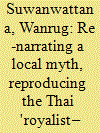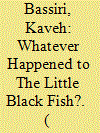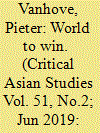| Srl | Item |
| 1 |
ID:
142848


|
|
|
|
|
| Summary/Abstract |
This analysis of 'The Myth of Sao Hai', a short story by the contemporary Thai author Daen-arun Saengthong, focuses on the transformative act of translating an oral provincial myth into written literary form. 'The Myth of Sao Hai' depicts the sacrifice for the 'nation' of a female spirit inhabiting a millennial tree in a remote part of the jungle. The contention in this paper is that the myth, as re-narrated by Daen-arun, reveals the problematic conditions under which peripheral voices are constantly relegated to a subaltern position in relation to the centre. These are the same conditions under which Thailand's local history has been written: that is to say, under and through a hegemonic 'royalist–nationalist' history. However, through an analysis of 'ironic fissure' – that is, of dissident voices which disrupt the narrative homogeneity – the paper argues that the relationship between the national and the local is not mirrored in a fixed binary opposition of oppression and subordination. Rather, the relationship is marked by ambivalence, an ambivalence that is crucial to the possibility of the writing and the 'narration' of both.
|
|
|
|
|
|
|
|
|
|
|
|
|
|
|
|
| 2 |
ID:
161395


|
|
|
|
|
| Summary/Abstract |
This essay uses retranslation studies to trace the defanging and domestication of Samad Behrangi’s The Little Black Fish, a children’s story once hailed as a major revolutionary and literary text. Behrangi’s book is the only modern Iranian prose work to have been translated multiple times both before and after the Islamic Revolution of 1979. The study compares the texts from several of these retranslations, by considering whether they have been domesticated for their English readers, as well as their context, by looking at the cultural impact of such factors as the Islamic Revolution and US‒Iran relations. It looks at how various translators and publishers have interpreted the story and how their perspectives reflect Iranian history, the influence of Middle East studies, and the interests of the Iranian diaspora. The result sheds light on translation norms, as well as on the circulation and interpretation of Iranian literature in the global context.
|
|
|
|
|
|
|
|
|
|
|
|
|
|
|
|
| 3 |
ID:
164678


|
|
|
|
|
| Summary/Abstract |
This article analyzes Chinese contributions to the Afro-Asian Writers’ Bureau’s efforts to reinvent World Literature from an anti-imperialist and anti-capitalist perspective. The Afro-Asian Writers’ Bureau was founded as a counter-narrative to Eurocentric conceptions of World Literature and universal culture. The AAWB’s vision was inspired by a Marxian understanding of worldliness. Relying on Chinese archival materials, this article shows how Chinese representatives to the AAWB, including Zhou Yang and Mao Dun, shifted from an explicitly Soviet, socialist-realist model for World Literature inspired by Maxim Gorky to a progressively independent, nationalist course in the wake of the Sino-Soviet split. The story of the AAWB is one of competing universal visions. The Chinese contributions to the AAWB are also reflected in China’s current expanding cultural influence and soft power in the Global South.
|
|
|
|
|
|
|
|
|
|
|
|
|
|
|
|